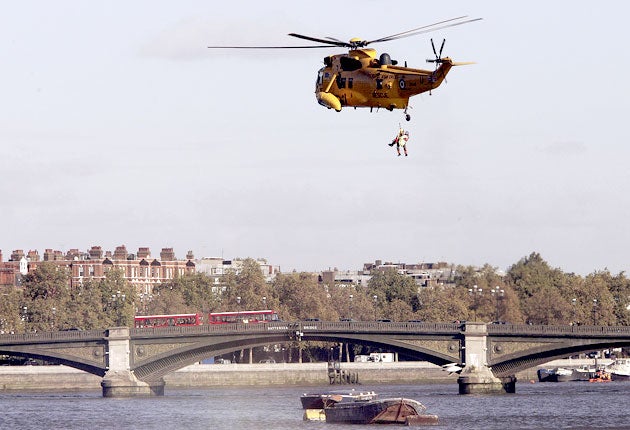Sea safety fear as coastguard stations slashed

Your support helps us to tell the story
From reproductive rights to climate change to Big Tech, The Independent is on the ground when the story is developing. Whether it's investigating the financials of Elon Musk's pro-Trump PAC or producing our latest documentary, 'The A Word', which shines a light on the American women fighting for reproductive rights, we know how important it is to parse out the facts from the messaging.
At such a critical moment in US history, we need reporters on the ground. Your donation allows us to keep sending journalists to speak to both sides of the story.
The Independent is trusted by Americans across the entire political spectrum. And unlike many other quality news outlets, we choose not to lock Americans out of our reporting and analysis with paywalls. We believe quality journalism should be available to everyone, paid for by those who can afford it.
Your support makes all the difference.The Government today slashed the number of 24-hour coastguard stations from 18 to three sparking fears about safety around the UK's coast.
Shipping Minister Mike Penning said the major reorganisation of the Coastguard would improve services and cut costs.
He added that the current system was "not well placed" to meet the challenge of larger ships, congested seas and the increasing number of people visiting coastal areas for leisure activities.
Trade unions reacted with fury, with the Rail, Maritime and Transport (RMT) union saying the Government was "hacking away at life or death services".
Western Isles MP Angus MacNeil said the Government was "putting saving money before saving lives".
Shadow transport minister Jim Fitzpatrick said: "There are real fears about the ability of such a reduced service to respond to incidents in good time and the loss of local knowledge can only hinder search and rescue operations."
In addition to the 18 coastguard maritime rescue co-ordination centres there is a small centre on the Thames in London which will be unaffected by today's proposals which will now be consulted on in a 14-week exercise.
In the Government's plan, there will be three 24-hour operational centres - at Aberdeen, in the Southampton/Portsmouth area and at Dover.
In addition, there will be five sub-centres open during daylight hours - at Swansea, at Falmouth in Cornwall, at Bridlington (Humber) in Yorkshire and at either Belfast or Liverpool and at either Stornoway or Shetland.
Mr Penning said the Aberdeen and Southampton/Portsmouth centres would be "maritime operations centres capable of managing maritime incidents wherever and whenever they occur and with improved information systems, together with a 24-hour centre at Dover looking over the busy Channel traffic separation scheme".
The sub-centres would be "fully integrated into the national network around the coast and operating during daylight hours".
Among coastguard stations to be axed under the Government plans are Bangor (Belfast) in Northern Ireland, Brixham in Devon, Holyhead in North Wales and Yarmouth in Norfolk.
Mr Penning said: "The Coastguard has a long and distinguished history. But in common with all public services it cannot stand still.
"Our seas are becoming busier, with larger ships and increasing numbers of offshore renewable energy platforms making key areas of our seas more congested. There are also increasing numbers of people using our beaches, coastlines and seas for leisure activities."
He added: "The current organisation of the Coastguard - which dates back some 40 years - is not well placed to respond to these challenges. The lack of national co-ordination between the centres can result in limited resilience and an uneven distribution of the workload, especially during busy periods."
RMT general secretary Bob Crow said: "It's a shocking indictment on this ConDem Government that plans to cut our coastguards could even be considered, let alone implemented, and shows that they are quite prepared to hack away at life or death services. These proposals must be fought tooth and nail every step of the way."
Mark Serwotka, general secretary of the Public and Commercial Services union, which represents 750 members in the Maritime and Coastguard Agency (MCA), said: "Coastguards are a highly respected and valued part of our coastal communities and they must not be forced out of their jobs."
Mr MacNeil said: "These proposals from the UK Government show a Government that puts saving money before saving lives, and will have a detrimental effect on many communities across the UK."
The Government had been due to make another maritime announcement today - about the the sell-off of search and rescue helicopters.
But Transport Secretary Philip Hammond said the preferred bidder "had become aware of a possible issue in connection with its bid".
He added that the matter needed to be clarified and that he and Defence Secretary Liam Fox would make a further statement to the House of Commons "as soon as we are able to provide further information and to set out our plans for proceeding to secure the provision of search and rescue helicopter capability in the future".
The search and rescue service is currently provided by the RAF and the Royal Navy, as well as civilian helicopters from the MCA.
The Soteria Consortium - which is made up of French defence company Thales, helicopter operator CHC and the Royal Bank of Scotland - plans to use the Sikorsky S92 helicopter.
That would spell the end for the Sea King fleet - as flown at present by Prince William, who is stationed at Anglesey in North Wales.
Join our commenting forum
Join thought-provoking conversations, follow other Independent readers and see their replies
0Comments